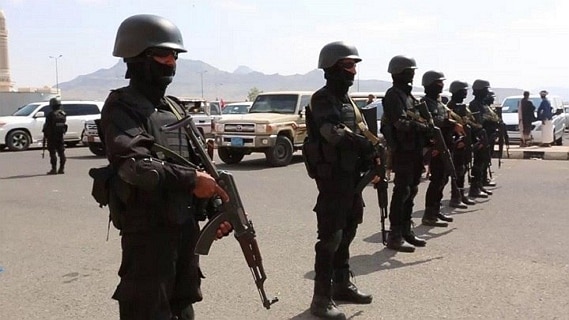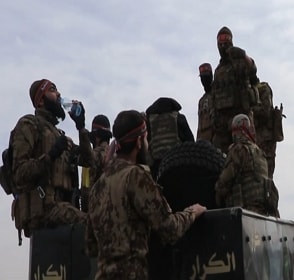The following report is now a complimentary offering from MEMRI's Jihad and Terrorism Threat Monitor (JTTM). For JTTM subscription information, click here.
Recently, Afghan Taliban leader Mullah Hibbatullah Akhundzada addressed a seminar of Islamic religious scholars organized by the Ministry of Higher Education in Kabul. According to a report on the ministry's website, the three-day seminar was held for the directors, teachers and assistants of the Directorate of Religious Universities and Specialties. A number of teachers of the Abdullah bin Masoud University also gave lectures on the ideal methods of teaching some subjects, school (library) management, and the principles and strategies of writing essays and research papers.
The seminar started with a speech by the Minister of Higher Education, Shiekh-ul-Hadith Mawlavi Nida Mohammad Nadeem, the Taliban commander who has single-handedly banished all girls and women from colleges and universities, and limited education only for men. According to the report, Nida Mohammad Nadeem stressed the need for standardization of religious universities and training of students, especially in jurisprudence and justice.
On the last day of the seminar, emir of the Islamic Emirate of Afghanistan (IEA, i.e., the Afghan Taliban) Mullah Hibbatullah Akhundzada gave a speech.

Excerpts from the report containing his speech are given below.
"[Islamic Religious] Scholars Have Been In The Service Of Jihad Throughout Their Lives... These Are The Scholars Who Have Kept Alive The Sunnah [Traditions] Of The Messenger Of Allah"
"The main and vital points of the Leader of the Islamic Emirate:
"1. Among the creations of Allah, [Islamic religious] scholars are the beloved servants, the righteous servants of Allah and the heirs of the prophets, the guardians of Allah's religion, the enforcers of Allah's religion, and the people chosen by Allah. Scholars have been in the service of jihad throughout their lives. So, these are the scholars who have kept alive the Sunnah [traditions] of the Messenger of Allah.
"2. Emir-ul-Momineen [Mullah Hibbatullah Akhundzada] emphasized sincerity in his speech and said that sincerity is very important in everything in order to properly protect religion; it takes a lot of effort to become a servant of religion. In order to train the future generations in a brilliant way, your duty is very appreciated, train them properly and keep the profane away from the phone in madrassas and universities. In this regard, we also wrote recommendations to madrassas to keep the students away from the phone because the phone wastes their teaching and study time.
"3. The position of Iftah [institutes that issue fatwas, religious decrees] is a very great position in my heart. Iftah is the principle of religion. Mufti [one who issues fatwas] is the one who teaches the religion to the people. If he has done it, if he has graduated from the major period, then bring him to the specialty of Iftah and Qaza [court]. Do not admit those who are not ready and apologize [for past mistakes] ...
"4. My ministers are nice people. They always obey me, and I am very happy with them. Obey, appreciate, and respect them.
"5. As it is obvious, the education of private specializations was not standard[ized] and they did not have the ability and possibilities according to the needs of the specialization. Therefore, we have created universities of specializations in the zones of the country. We have all the possibilities at our disposal. In order to be able to train men in the judicial and legal fields of the Islamic system and present them to the society for service, the doors of these universities and specializations are open to all qualified scholars and teachers. They can participate in the universities of the zones by fulfilling the conditions; we provide them with the necessary facilities."
"Even In Islamic Countries, Scholars Do Not Participate In Politics, And If They Enter Politics, Then They Cannot Talk About Religion Even In The Courtyard Of The Seminary"
"6. Emir-ul-Momineen [Mullah Hibbatullah Akhundzada] said that the students have to be lectured and given certificate according to their qualifications.
"7. Scholars should make the people aware... [of] the benefits of the Islamic system, prevent differences and deviations, and lead them away from disobedience of leaders. If you see the decree against the shari'a, then throw it away.
"8. After the domination, we have pardoned all our opponents, live with them as brothers; they are our people; we did not aim to kill Afghans before, and now we do not intend to harm them. However, those who were killed by us were because of going in front of the enemies. This was also the demand of the people from the scholars, but the non-Muslims get sad to see us unified.
"9. The non-Muslim world wants to separate religion and politics. Even in Islamic countries, scholars do not participate in politics, and if they enter politics, then they cannot talk about religion even in the courtyard of the seminary."
As per the report, after Mullah Hibbatullah Akhundzada's speech, one of the participants of the seminar who spoke on behalf of the participants was Shiekh Abdul Malik Noioazai, the Director of Abdullah bin Masoud Religious University.
"He said that scholars are standing behind their leader. And they accept his orders. In his speech, he talked about the mission of religious universities and specializations, and the training of students who are academically strong and ethically honest. He mentioned the important part of this mission, and he considered it his responsibility to protect the intellectual boundaries of society..."
The full text of this post is available to subscribers.
Please login or register to request subscription information from MEMRI






